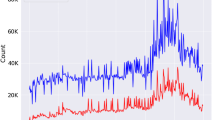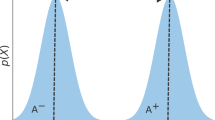Abstract
Political parties often engage in verbal swordplay, which worsens during elections. Free and fair elections are the pillar of a democratic society. Come election season, all media outlets, including the Internet, are buzzing with politically-charged content. We curated 46 k posts from Twitter between January and March, 2022 to examine political content during the Indian assembly elections of February 2022. We begin our analysis by manually labeling 1.7 k posts for different forms of attack and employ the annotation to examine political attacks against defamatory hashtags and name-calling. It anecdotally lends itself to the target’s online reputation. Similarly, we quantify the power dynamics of self-promotion and negation pinned on the ruling party before and after elections. To aid large-scale analysis, we obtain pseudo-labels for the rest of the dataset via training a political attack detector for the Indic setting. Subsequently, we observe that the patterns detected via manual annotations hold at scale too. Our analyses and findings aim to educate the citizenry about the quality of political discourse on Indian Twitter.


Similar content being viewed by others
Data availability
Following Twitter’s data-sharing policy, the tweet-ids, corresponding attack labels, and source code of all the analyses and modeling are available at https://github.com/LCS2-IIITD/india_pol_attack.
References
Awal MR, Cao R, Lee RK, Mitrovic S (2021) AngryBERT: joint learning target and emotion for hate speech detection. In: Karlapalem K, Cheng H, Ramakrishnan N, Agrawal RK, Reddy PK, Srivastava J, et al, (eds) Advances in knowledge discovery and data mining—25th Pacific-Asia conference, PAKDD 2021, Virtual Event, May 11–14, 2021, proceedings, Part I. vol 12712 of Lecture notes in computer science. Springer. pp 701–713. https://doi.org/10.1007/978-3-030-75762-5_55
Borah A, Singh SR (2022 Jul) Investigating political polarization in India through the lens of Twitter. Soc Netw Anal Mining. 12(1). https://doi.org/10.1007/s13278-022-00939-z
Cao R, Lee RK, Hoang T (2021) DeepHate: hate speech detection via multi-faceted text representations. CoRR. ar** in the bud: detection, diffusion and mitigation of hate speech on social media. SIGWEB Newsl 2022(Winter ):3:1–3:9. https://doi.org/10.1145/3522598.3522601
Chan TKH, Cheung CMK, Lee ZWY (2021) Cyberbullying on social networking sites: a literature review and future research directions. Inf Manag 58(2):103411
Davidson T, Warmsley D, Macy M, Weber I (2017) Automated hate speech detection and the problem of offensive language. In: ICWSM, pp 512–515
Devlin J, Chang MW, Lee K, Toutanova K (2019) BERT: pre-training of deep bidirectional transformers for language understanding. In: NAACL, pp 4171–4186
García Benítez-D’Ávila H (2022) Populism and polarization in the digital arena: categorizing and measuring political attacks on Twitter
Harriss J (2015) Hindu Nationalism in Action: The Bharatiya Janata Party and Indian Politics. South Asia: J South Asian Stud 38(4):712–718. https://doi.org/10.1080/00856401.2015.1089826
Jafri FA, Siddiqui MA, Thapa S, Rauniyar K, Naseem U, Razzak I (2023) Uncovering the dynamics of political hate speech during Indian Election Campaign: a new low-resource dataset and baselines. In: Workshop proceedings of the 17th ICWSM
Jakesch M, Garimella K, Eckles D, Naaman M (2021) Trend alert: a cross-platform organization manipulated Twitter Trends in the Indian General election. Proc ACM Hum-Comput Interact. 5
Kakwani D, Kunchukuttan A, Golla S, N C G, Bhattacharyya A, Khapra MM, et al (2020) IndicNLPSuite: monolingual corpora, evaluation benchmarks and pre-trained multilingual language models for Indian languages. In: Findings of the Association for Computational Linguistics: EMNLP 2020. Online: Association for Computational Linguistics, pp 4948–4961. Available from: https://aclanthology.org/2020.findings-emnlp.445
Kalmoe NP (2014) Fueling the fire: violent metaphors, trait aggression, and support for political violence. Polit Commun 31:545–63
Kumar K (2022) Changing political landscape in state assembly elections of Uttar Pradesh. J Positive School Psychol, 7752–7762
Masud S, Bedi M, Khan MA, Akhtar MS, Chakraborty T (2022) Proactively reducing the hate intensity of online posts via hate speech normalization. In: Proceedings of the 28th ACM SIGKDD conference on knowledge discovery and data mining. KDD ’22. Association for Computing Machinery: New York. pp 3524–3534. https://doi.org/10.1145/3534678.3539161
Masud S, Dutta S, Makkar S, Jain C, Goyal V, Das A, et al. (2021) Hate is the New Infodemic: a topic-aware modeling of hate speech diffusion on Twitter. In: 37th IEEE International conference on data engineering, ICDE 2021, Chania, Greece, April 19–22, 2021. IEEE. pp 504–515. https://doi.org/10.1109/ICDE51399.2021.00050
Nellis G (2023) Election cycles and global religious intolerance. In: Proceedings of the National Academy of Sciences. 120(1):e2213198120. https://doi.org/10.1073/pnas.2213198120
Petkevic V, Nai A (2022) Political attacks in 280 characters or less: a new tool for the automated classification of campaign negativity on social media. Am Polit Res 50(3):279–302
Piazza JA (2020) Politician hate speech and domestic terrorism. Int Interactions 46(3):431–53
Rheault L, Rayment E, Musulan A (2019) Politicians in the line of fire: incivility and the treatment of women on social media. Res Polit 6(1):2053168018816228
Schmidt A, Wiegand M (2017) A survey on hate speech detection using natural language processing. In: Proceedings of the fifth international workshop on natural language processing for social media, pp 1–10
Siddarth D, Shankar R, Pal J (2021) We do politics so we can change politics’: communication strategies and practices in the Aam Aadmi Party’s institutionalization process. Inf Commun Soc 24(10):1361–1381. https://doi.org/10.1080/1369118X.2020.1856910
Singh AK, Jain J, Kameswari L, Kumaraguru P, Pal J (2022) Note: urbanization and literacy as factors in politicians’ social media use in a largely rural state: evidence from Uttar Pradesh, India. In: ACM COMPASS, pp 564–568
Solovev K, Pröllochs N (2022) Hate Speech in the political discourse on social media: disparities across parties, gender, and ethnicity. In: Proceedings of the ACM web conference 2022. WWW ’22. New York, NY, USA: Association for Computing Machinery, pp 3656–3661. https://doi.org/10.1145/3485447.3512261
Turbic NGB, Galesic M (2023) Group threat, political extremity, and collective dynamics in online discussions. Sci Rep. 13(1). https://doi.org/10.1038/s41598-023-28569-1
Waller I, Anderson A (2021) Quantifying social organization and political polarization in online platforms. Nature. 600(7888):264–268. https://doi.org/10.1038/s41586-021-04167-x
Waseem Z, Davidson T, Warmsley D, Weber I (2017) Understanding abuse: a typology of abusive language detection subtasks. In: Proceedings of the first workshop on abusive language online, pp 78–84
Zahrah F, Nurse JRC, Goldsmith M (2022) A comparison of online hate on Reddit and 4chan: a case study of the 2020 US Election. In: ACM SIGAPP. pp 1797–1800
Zhuravskaya E, Petrova M, Enikolopov R (2020) Political effects of the internet and social media. Annu Rev Econ 12(1):415–38
Acknowledgements
The authors would like to thank Drishya and Priyanshi for contributing to the initial data curation and annotation. Sarah is supported by the Prime Minister Doctoral Fellowship in partnership with Wipro AI and SERB India.
Funding
The work is not funded by any political group.
Author information
Authors and Affiliations
Contributions
S.M. contributed to data collection, annotation, and modeling. S.M. and T.C. analysed and wrote the paper. Both the authors reviewed the manuscripts.
Corresponding author
Ethics declarations
Competing interest
The authors declare no competing interest. The authors are not affiliated with any political group.
Additional information
Publisher's Note
Springer Nature remains neutral with regard to jurisdictional claims in published maps and institutional affiliations.
Supplementary Information
Below is the link to the electronic supplementary material.
Rights and permissions
Springer Nature or its licensor (e.g. a society or other partner) holds exclusive rights to this article under a publishing agreement with the author(s) or other rightsholder(s); author self-archiving of the accepted manuscript version of this article is solely governed by the terms of such publishing agreement and applicable law.
About this article
Cite this article
Masud, S., Charaborty, T. Political mud slandering and power dynamics during Indian assembly elections. Soc. Netw. Anal. Min. 13, 108 (2023). https://doi.org/10.1007/s13278-023-01103-x
Received:
Revised:
Accepted:
Published:
DOI: https://doi.org/10.1007/s13278-023-01103-x




